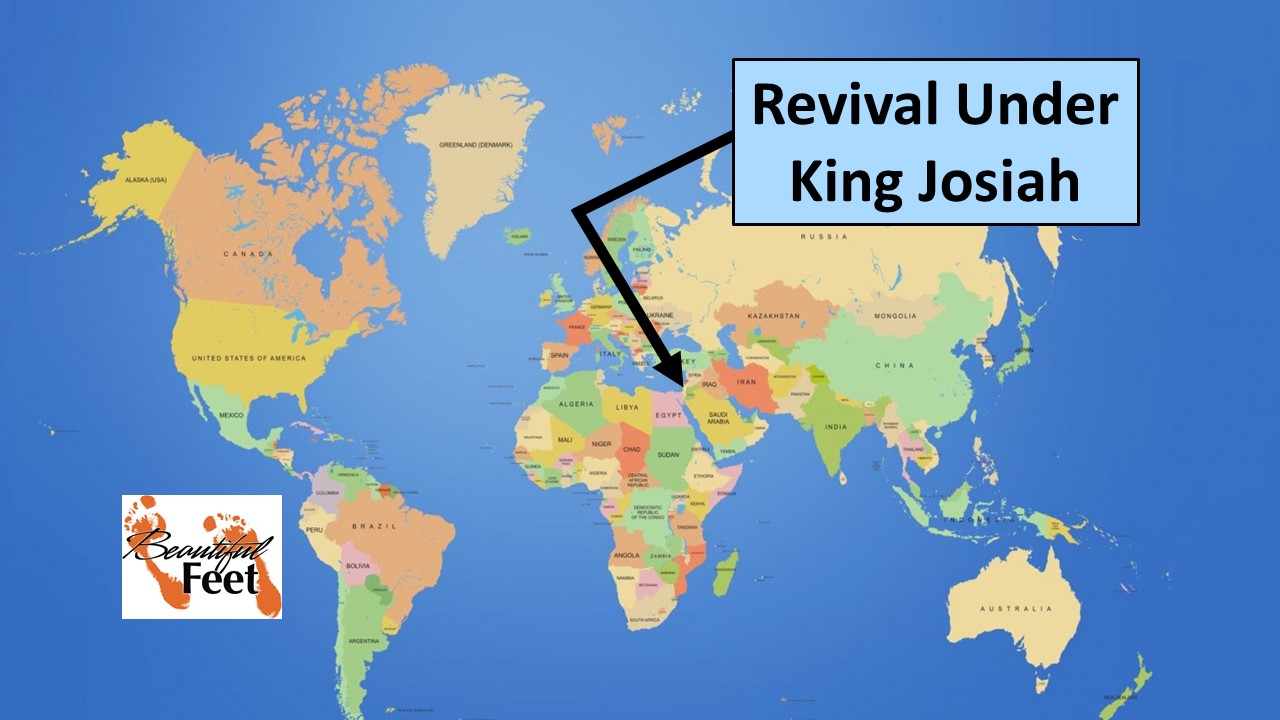

Background
The nation of Israel was a united kingdom during the reigns of the first two kings, David, and his son Solomon. Due to Solomon’s rebellion against God, God told him that after his death the kingdom would be divided.
Solomon built such shrines for all his foreign wives to use for burning incense and sacrificing to their gods. The Lord was very angry with Solomon, for his heart had turned away from the Lord, the God of Israel, who had appeared to him twice. He had warned Solomon specifically about worshiping other gods, but Solomon did not listen to the Lord’s command. So now the Lord said to him, “Since you have not kept my covenant and have disobeyed my decrees, I will surely tear the kingdom away from you and give it to one of your servants” (1 Kings 11:8-10; see also 1 Kings 11:29-33).
When Solomon’s son Rehoboam became the next king, according to the plan of God the northern tribes rebelled against him and they installed Jeroboam as their king (1 Kings 12:20). King Jeroboam knew that many from his northern kingdom would return to Jerusalem several times per year for sacrifices and feasts at the temple. He feared this would weaken his control over his kingdom and ultimately lead to the reuniting of the nation and then to his and his family’s execution (1 Kings 12:26-27).
To stop the flow of people from his kingdom to Jerusalem, Jeroboam erected two places of worship in his land, with a golden calf being the object of worship at each location. One location was in the far northern city of Dan, and the other in the southern part, in the city of Bethel (1 Kings 12:28-30).
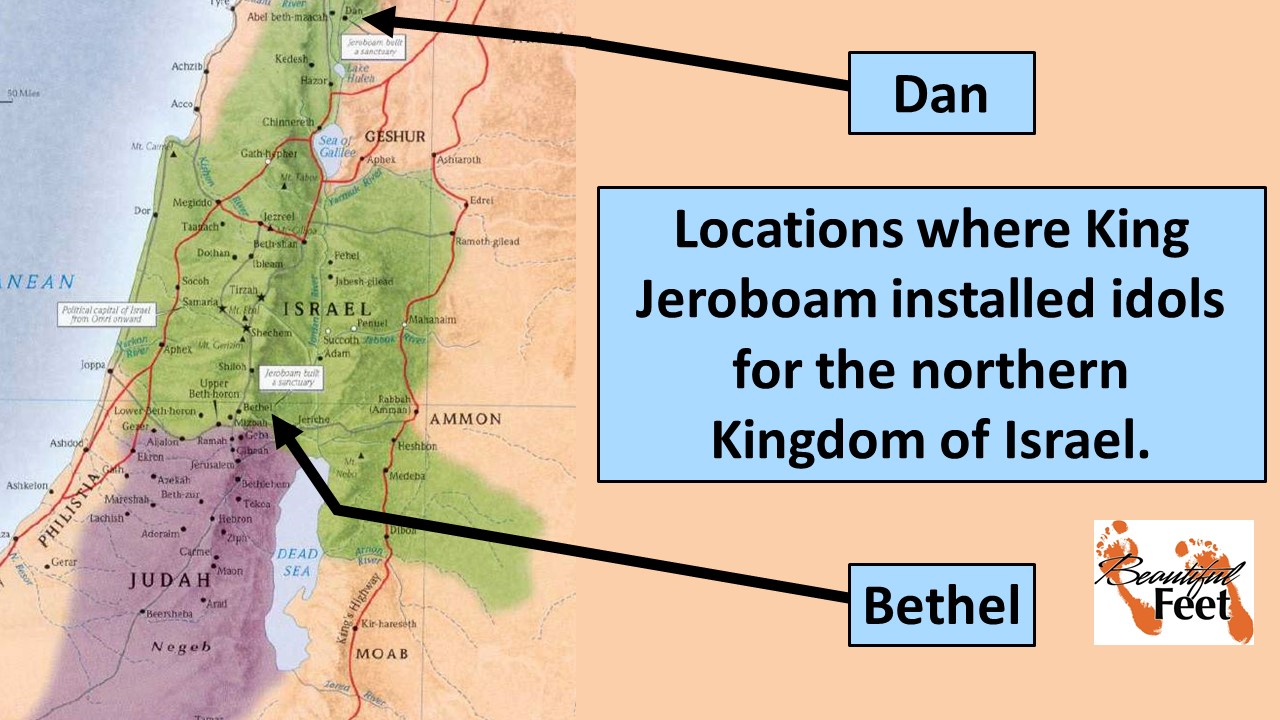
Prophecy of Josiah’s Birth and the Desecration of the Altar at Bethel
An unknown prophet from the Kingdom of Judah was told by God to go to Bethel and prophesy against the altar that Jeroboam had recently erected there. This prophecy wasn’t only intended to be aimed at this isolated altar, but against the entire organized idolatrous system that Jeroboam had set up throughout the Kingdom of Israel. This prophet prophesied that:
► There would be a descendant of David born, who would be named Josiah (1 Kings 13:1-2).
► Josiah would desecrate the altar at Bethel (1 Kings 13:2).
► The altar would split open, and the ashes would be poured out on the ground (1 Kings 13:3).
Birth of Josiah: Partial Fulfillment of 1 Kings 13:1-3 Prophecy
Close to 360 years after the prophecy was spoken by the prophet at Bethel, Josiah, son of King Amon, was born. He commenced his reign as king of Judah after his father’s death, when he was 8 years old (2 Kings 22:1).
Josiah was one of the few godly kings. The Scriptures tell us that:
► He did what was pleasing in the Lord’s sight.
► He followed the example of his ancestor David.
► He did not turn away from doing what was right (2 Kings 22:2).
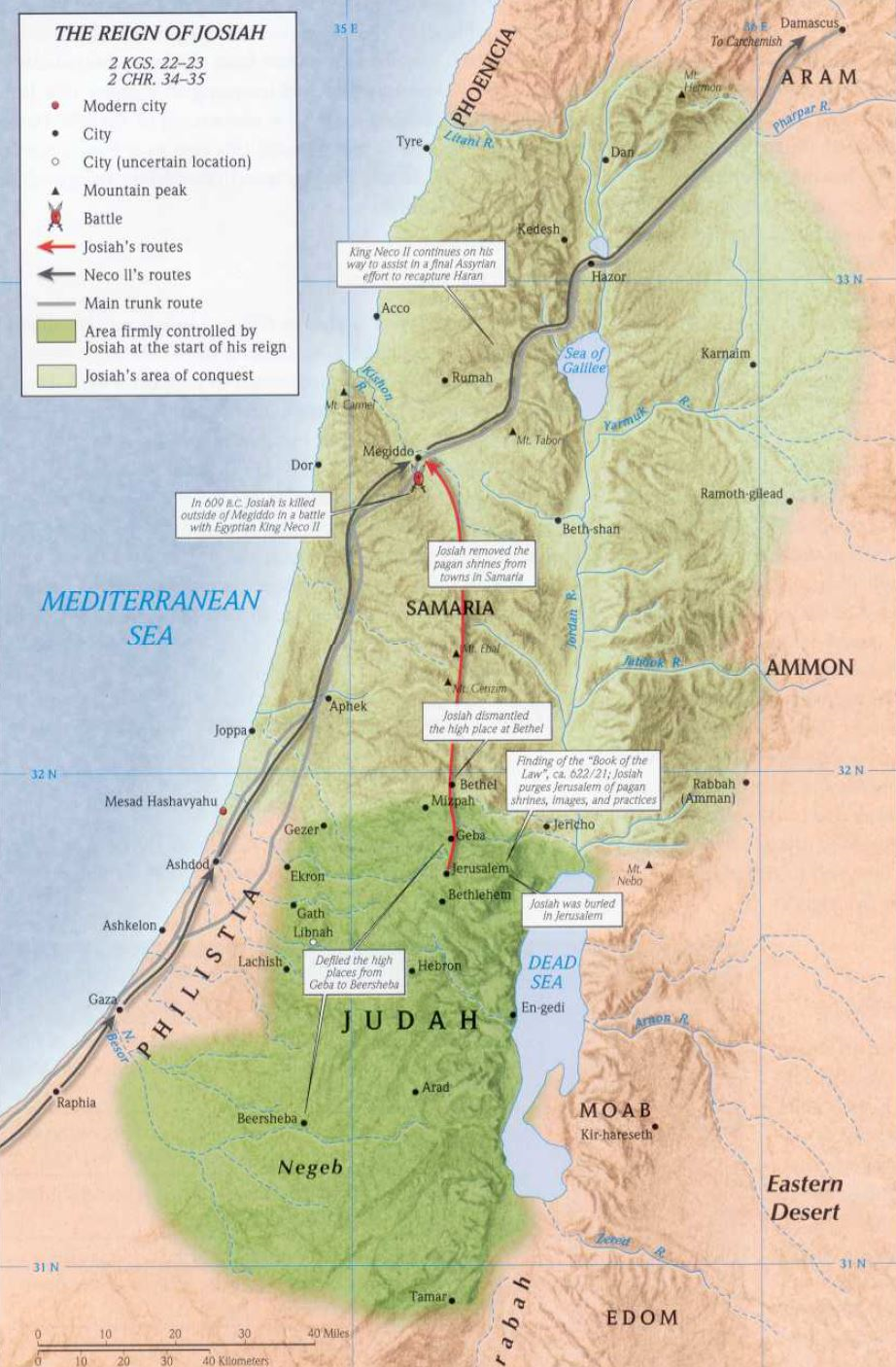
Kingdom of Judah under King Josiah
Steps Josiah Took
In the 8th year of his reign, when he was 16 years old, he “began to seek the God of his ancestor David” (2 Chronicles 34:3).
In the 12th year of his reign, when he was 20 years old, he began to purify Judah and Jerusalem by destroying all
► Pagan shrines
► Asherah poles
► Carved idols
► Cast images
► Altars of Baal
► Incense altars
(2 Chronicles 34:3-4)
All these objects were smashed and scattered over the graves of those who sacrificed to them. Josiah then took an even more dramatic step by having the bodies of the dead pagan priests exhumed and their bones burned on their own altars (2 Chronicles 34:4-5).
Josiah ordered the destruction of all of these idolatrous practices throughout his kingdom, and even in the land that was previously the northern Kingdom of Israel (2 Chronicles 34:6-7).
In the 18th year of his reign, when he was 26 years old, he ordered the priests to repair the temple of the Lord which had not been maintained (2 Kings 22:3-6;. 2 Chronicles 34:8-11).
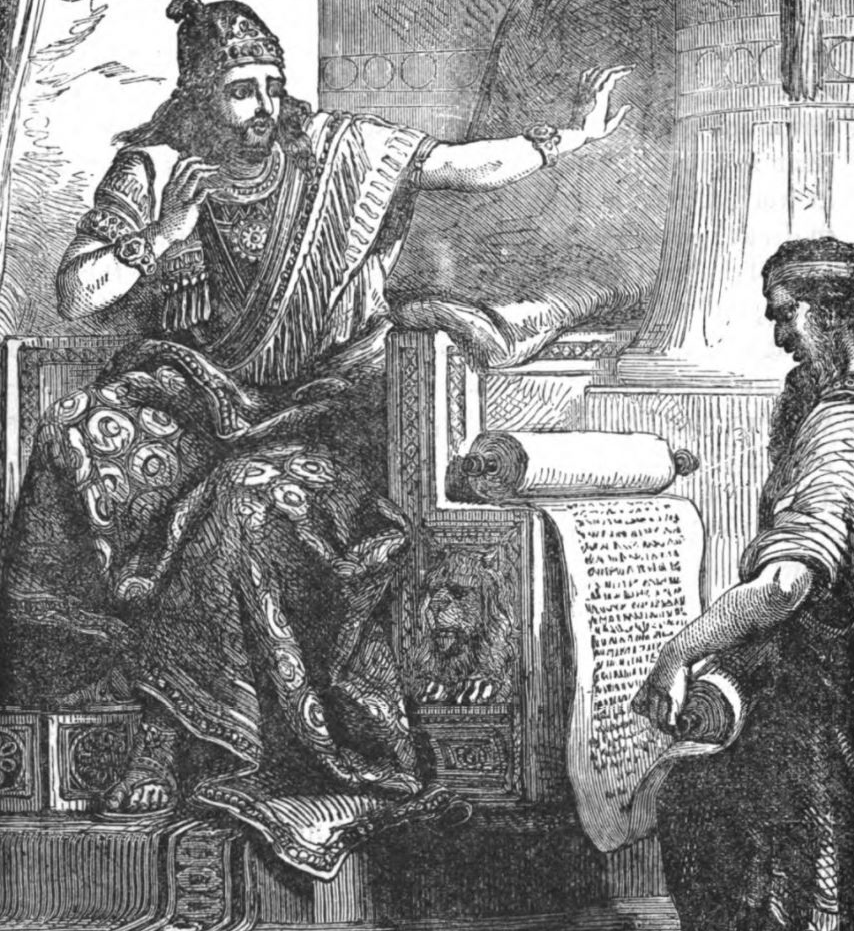
The newly found law of the Lord being read to King Josiah
Discovery of the Law (the Word of God)
During the cleansing (of all idolatrous images) and repairing of the temple in Jerusalem, the high priest, Hilkiah, found “the Book of the Law.” The court secretary then took the scroll to King Josiah and read it to him (2 Kings 22:8-10;. 2 Chronicles 34:14-18).
After hearing what was written in the scroll, and being in despair knowing that God’s anger was being poured out on the nation because of their rejection of God and failure to worship Him, he sent his advisors to inquire of the Lord, and that was accomplished by them going to the prophetess Huldah (2 Kings 22:11-14;. 2 Chronicles 34:19-22). Through this action he bypassed the prophet Jeremiah, who had already been ministering in Judah for five years (Jeremiah 1:2).
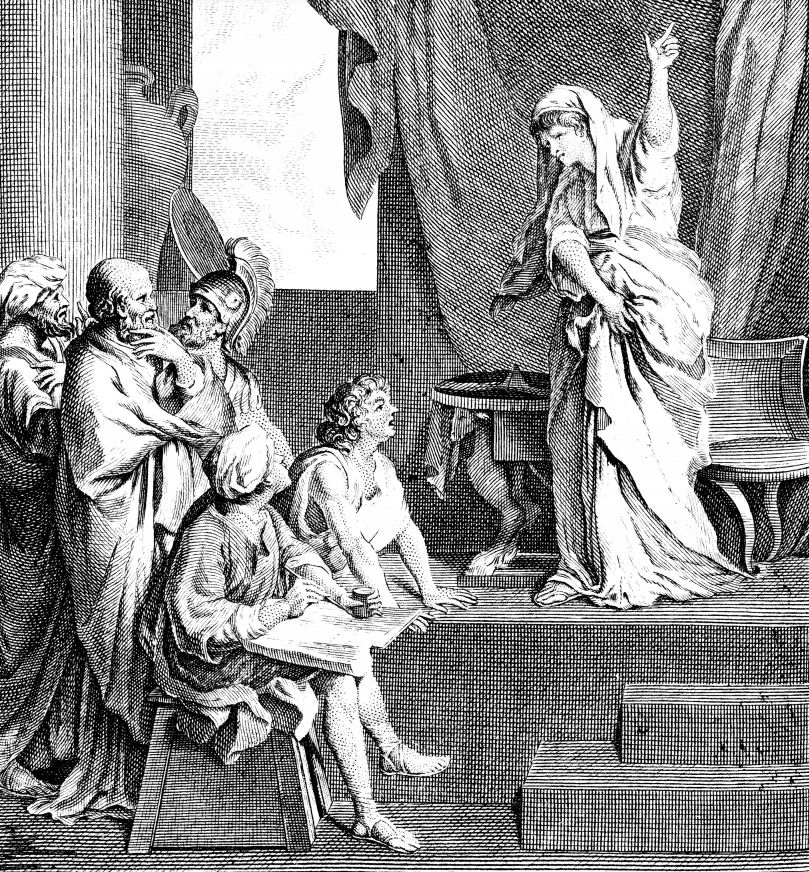
Consulting with the Prophetess Huldah (2 Kings 22:14)
After the high priest and other court officials asked Huldah about this scroll, and after she prayed, the Lord’s reply was:
► Disaster will come upon Jerusalem and its people.
► It is God’s judgment because they have abandoned Him and offered sacrifices to pagan gods.
► His anger will not be quenched.
► Because King Josiah humbled himself, disaster would not come until after he is dead.
(2 Kings 22:15-20;. 2 Chronicles 34:23-28).
Renewal of the Nation’s Devotion to God
Following the reply Josiah received from the prophetess Huldah, he assembled all the elders from throughout his kingdom and they gathered at the temple in Jerusalem and listened while he read the Book of the Covenant to them (2 Kings 23:1-2;.2 Chronicles 34:29-30).
With unanimous agreement, the king, all the elders, as well as all the people, pledged to obey the Lord in the keeping of His commands (2 Kings 23:3;. 2 Chronicles 34:31-32).
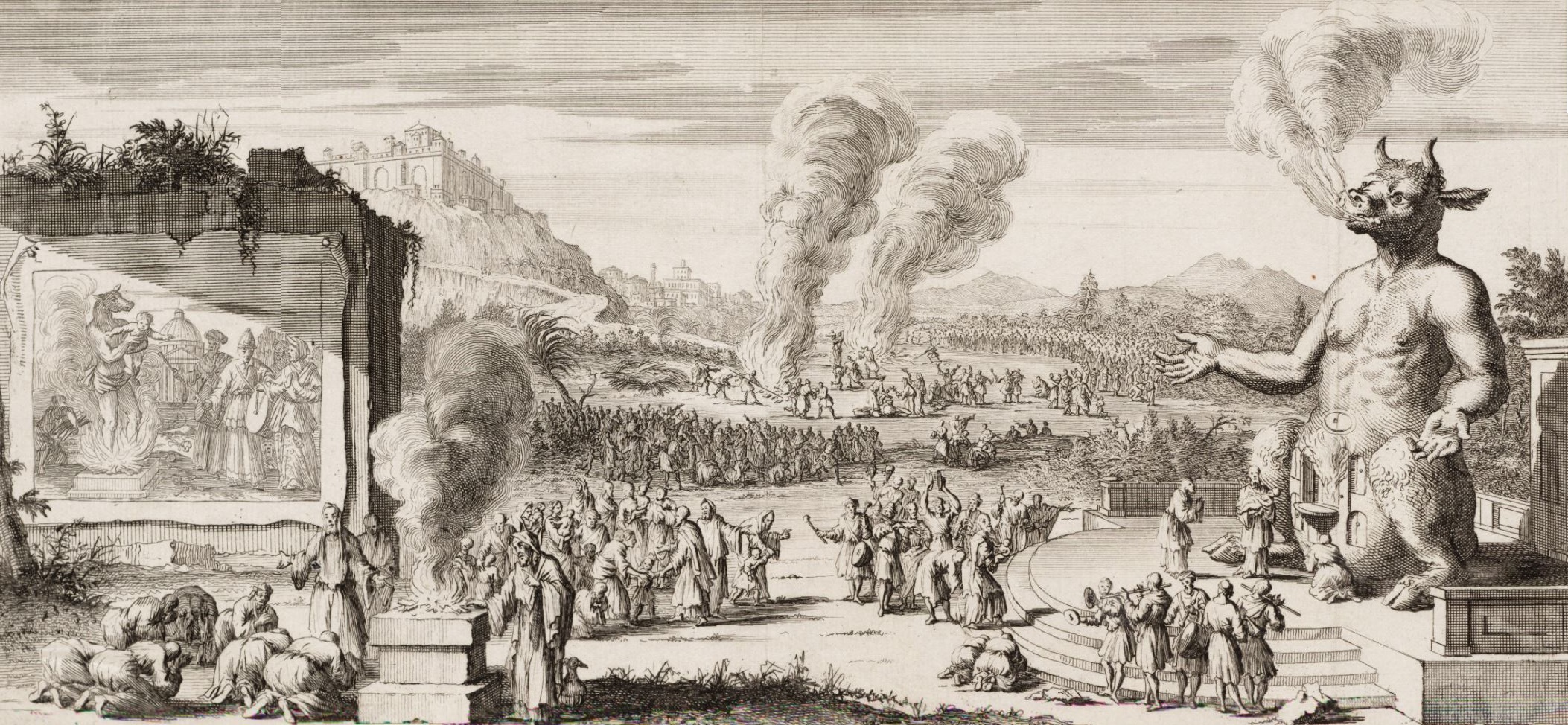
Altar of Topheth and the god Molech (right click to open tab for high resolution)
Josiah’s Religious Reforms
Following the renewed pledge of obedience, King Josiah set in motion the complete purging of idolatry and pagan worship throughout the land. This included:
► Defilement of all pagan shrines where sacrifices were offered.
► Removal of any priests who had served at the pagan shrines. Those priests were forbidden from serving at the Lord’s altar in Jerusalem.
► Destruction of the altar of Topheth, which was used for child sacrifices (possibly sacrifices to the god Molech).
► Destruction of the horse statues that were dedicated to the sun god.
► Burning of the chariots dedicated to the sun god.
► Destruction of the altars King Solomon had built for the worship of the pagan gods Ashtoreth, Chemosh, and Molech.
► Destruction of the sacred pillars and the cutting down of the Asherah poles. He also desecrated those places by scattering human bones over them.
(2 Kings 23:8-20;.2 Chronicles 34:33)
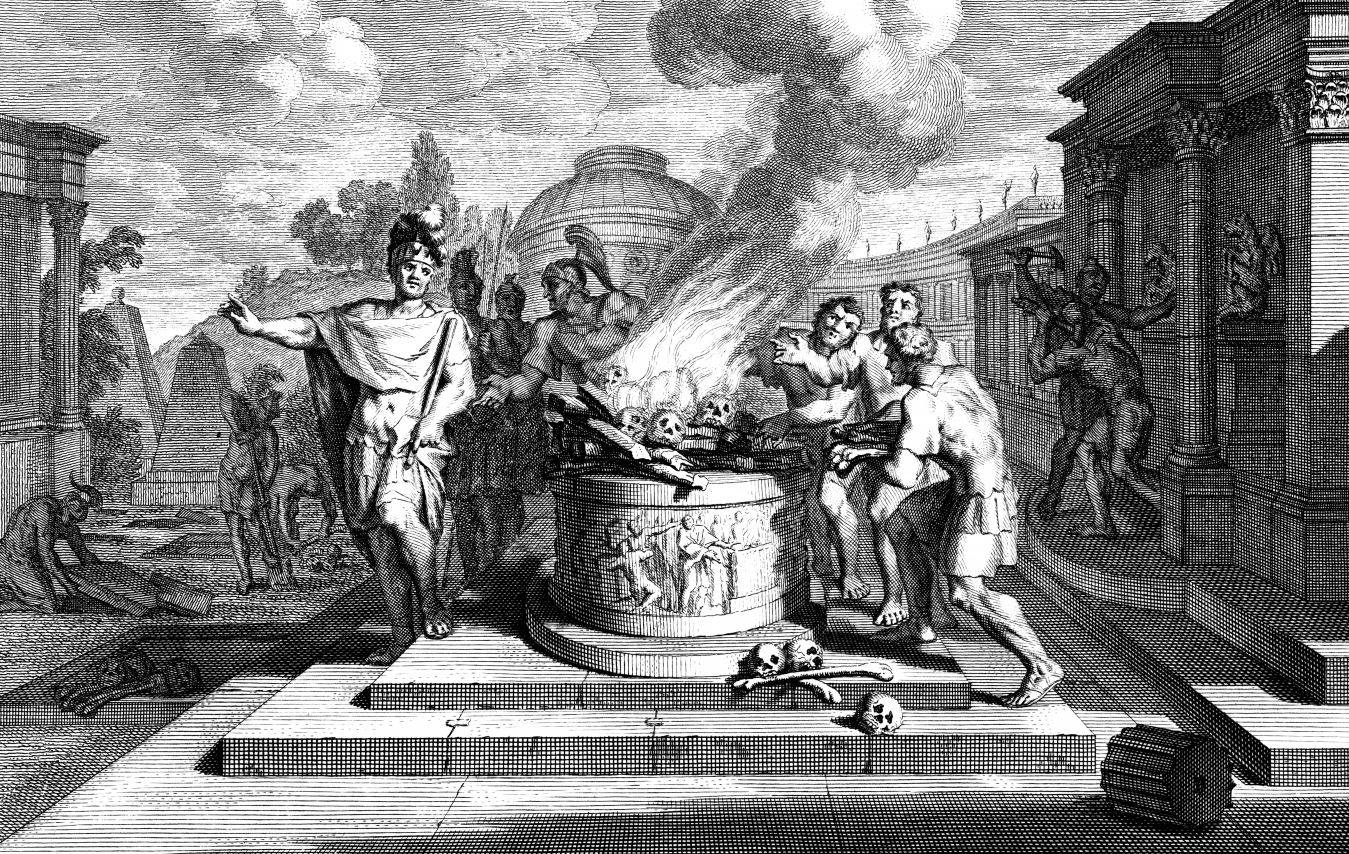
Scattering human bones on altars and smashing sacred pillars
The Altar at Bethel
At around 722 B.C., the northern Kingdom of Israel came to an end when it was overthrown by the Assyrians. Most of the Israelites who remained in the land were forcefully deported and resettled “in colonies in Halah, along the banks of the Habor River in Gozan, and in the cities of the Medes” (2 Kings 17:5-6).
With the destruction and deportation of the people from the area previously inhabited by the northern Kingdom of Israel, Josiah expanded his influence into that area, and this influence involved the destruction of idols located there, and specifically the altar at Bethel.
To ensure the idolatrous site at Bethel was rendered unfit for future idol worship, Josiah had the bones of the idol priests exhumed from the nearby cemetery, and he burned them on that altar. This was the altar that had been erected by the northern Kingdom of Israel, under their first king, Jeroboam. This burning of bones was the fulfillment of the prophecy spoken around 300 years earlier (1 Kings 13:1-3;.2 Kings 23:15-20).
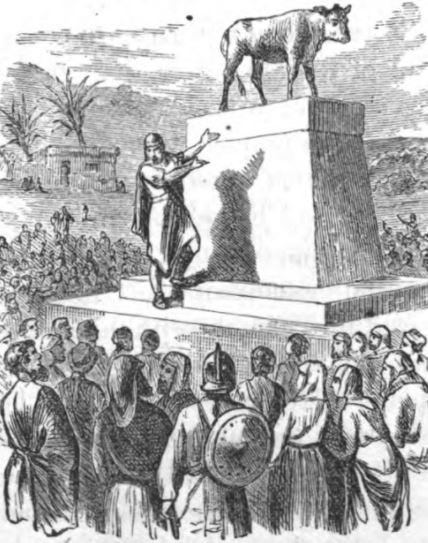
The golden calf at Bethel
Passover
Also in the 18th year of Josiah’s reign he hosted the Passover celebration in Jerusalem (2 Chronicles 35:19). This was a memorial of the LORD’s work in freeing Israel from slavery in Egypt. The LORD had instructed his people to celebrate the Passover annually, but this command had not been obeyed. Josiah reinitiated the celebration by calling the people together, and he himself supplied them with 33,000 animals for sacrifice (2 Chronicles 35:7). All of Judah came, as well as many from Israel — those who were still remaining in the land after their forced exile by the Assyrians. This was considered the most complete Passover celebration since the days of the prophet Samuel, about 400 years earlier (2 Kings 23:1-28;.2 Chronicles 34:29-35:19).
Sources
► Prophecy of Josiah’s birth: 1 Kings 13:1-5
► Josiah succeeds his father King Amon: 2 Kings 21:26;.2 Chronicles 33:24-25
► Josiah’s reign: 2 Kings 22:1-20;.2 Chronicles 34:1-33
► Josiah’s religious reforms, Passover celebration, and death: 2 Kings 23:1-30;.2 Chronicles 35:1-27
► Josiah was just and right in all his dealings. That is why God blessed him: Jeremiah 22:15
Return to List of Revival Stories
Chet & Phyllis Swearingen:
Office: (260) 920-8248
romans1015@outlook.com
Beautiful Feet
P.O. Box 915
Auburn, IN 46706

